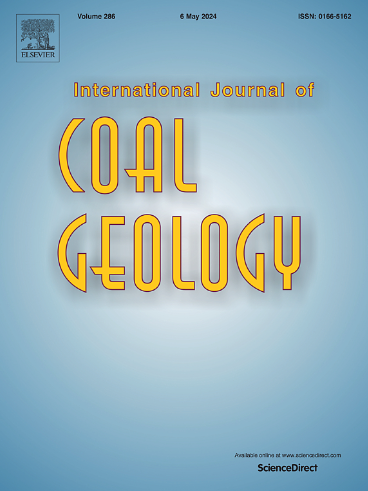Petroleum evolution and its genetic relationship with the associated Jinding PbZn deposit in Lanping Basin, Southwest China
IF 5.7
2区 工程技术
Q2 ENERGY & FUELS
引用次数: 0
Abstract
The spatial association of hydrocarbons with metalliferous ore deposits is found worldwide and is particularly common to MVT Pb![]() Zn deposits. Heavy oil and bitumen are found in the Jinding Pb
Zn deposits. Heavy oil and bitumen are found in the Jinding Pb![]() Zn deposit within the Lanping Basin, South China. However, the temporal and genetic associations between hydrocarbons and the deposit are still controversial. To this end, integrating Raman analysis, Re
Zn deposit within the Lanping Basin, South China. However, the temporal and genetic associations between hydrocarbons and the deposit are still controversial. To this end, integrating Raman analysis, Re![]() Os geochronology and transmission electron microscopy analysis of the bitumen and in situ S isotope analyses of the sulfide, the petroleum evolution of the Jinding reservoir and its genetic relationship with the Pb
Os geochronology and transmission electron microscopy analysis of the bitumen and in situ S isotope analyses of the sulfide, the petroleum evolution of the Jinding reservoir and its genetic relationship with the Pb![]() Zn deposits were discussed. Bitumen Re
Zn deposits were discussed. Bitumen Re![]() Os data from this study and published works indicate that the late Triassic shales underwent two distinct oil-generation events before mineralisation (∼25 Ma), with initial oil generation occurring during the early Cretaceous (∼116 Ma) and the second during the early Paleogene (ca. 68–59 Ma). These two ages agree with the modelled thermal history of the Jinding reservoir. Combining the oil-before-ore timing sequence, high metal abundance of the bitumen, two negative sulfur isotope peaks of the sulfide and high S/C atomic ratio of the bitumen from the Jinding deposit, the oil-containing aqueous solutions were considered as one metal carrier during the hydrocarbon migration and accumulation; further, bacterial sulfate reduction and thermo-chemically induced sulfate reduction processes could have participated in the supply of reduced sulfur for the Pb
Os data from this study and published works indicate that the late Triassic shales underwent two distinct oil-generation events before mineralisation (∼25 Ma), with initial oil generation occurring during the early Cretaceous (∼116 Ma) and the second during the early Paleogene (ca. 68–59 Ma). These two ages agree with the modelled thermal history of the Jinding reservoir. Combining the oil-before-ore timing sequence, high metal abundance of the bitumen, two negative sulfur isotope peaks of the sulfide and high S/C atomic ratio of the bitumen from the Jinding deposit, the oil-containing aqueous solutions were considered as one metal carrier during the hydrocarbon migration and accumulation; further, bacterial sulfate reduction and thermo-chemically induced sulfate reduction processes could have participated in the supply of reduced sulfur for the Pb![]() Zn deposit precipitation.
Zn deposit precipitation.
石油演化及其与中国西南兰坪盆地金鼎铅锌矿床的成因关系
碳氢化合物与金属矿床的空间关联在世界各地都有发现,尤其常见于中低压铅锌矿床。在中国南方兰坪盆地的金鼎铅锌矿床中发现了重油和沥青。然而,碳氢化合物与该矿床之间的时间和遗传关联仍存在争议。为此,结合沥青的拉曼分析、ReOs地质年代学和透射电子显微镜分析以及硫化物的原位S同位素分析,讨论了金鼎储层的石油演化及其与铅锌矿床的成因关系。本研究和已发表的沥青ReOs数据表明,晚三叠世页岩在成矿之前(25Ma)经历了两次不同的石油生成过程,第一次石油生成发生在早白垩世(116Ma),第二次发生在早古近纪(约68-59Ma)。这两个年代与金鼎油藏的模拟热历史相吻合。结合金鼎矿床先油后矿时间序列、沥青的高金属丰度、硫化物的两个负硫同位素峰和沥青的高S/C原子比,可以认为含油水溶液是碳氢化合物迁移和聚集过程中的一个金属载体;此外,细菌的硫酸盐还原和热化学诱导的硫酸盐还原过程可能参与了铅锌矿床沉淀的还原硫供应。
本文章由计算机程序翻译,如有差异,请以英文原文为准。
求助全文
约1分钟内获得全文
求助全文
来源期刊

International Journal of Coal Geology
工程技术-地球科学综合
CiteScore
11.00
自引率
14.30%
发文量
145
审稿时长
38 days
期刊介绍:
The International Journal of Coal Geology deals with fundamental and applied aspects of the geology and petrology of coal, oil/gas source rocks and shale gas resources. The journal aims to advance the exploration, exploitation and utilization of these resources, and to stimulate environmental awareness as well as advancement of engineering for effective resource management.
 求助内容:
求助内容: 应助结果提醒方式:
应助结果提醒方式:


